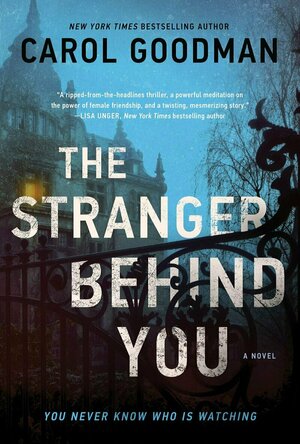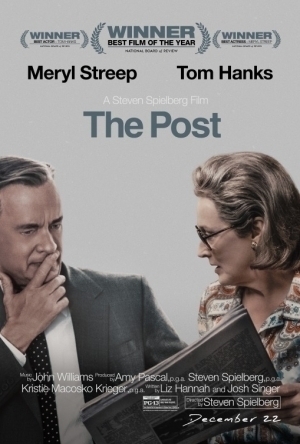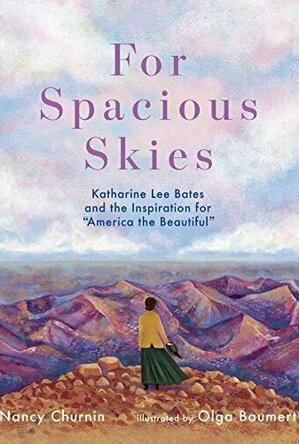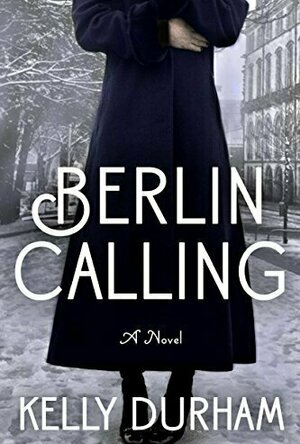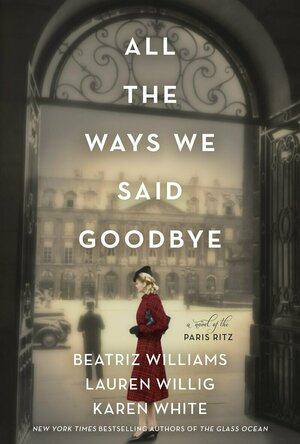
All the Ways We Said Goodbye
Karen White, Beatriz Williams and Lauren Willig
Book
The heiress . . . The Resistance fighter . . . The widow . . . Three women whose fates are joined...
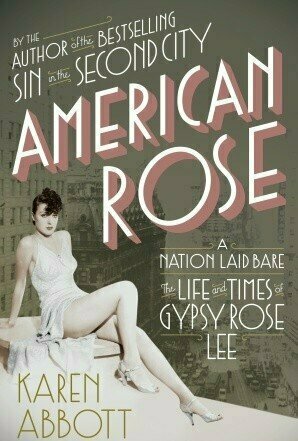
American Rose: A Nation Laid Bare: The Life and Times of Gypsy Rose Lee
Book
With the critically acclaimed Sin in the Second City, bestselling author Karen Abbott “pioneered...
Cody Cook (8 KP) rated A Black Theology of Liberation in Books
Jun 29, 2018
One major issue for Cone is one of authority. The experience of one group of people (the oppressed) becomes equivalent with universal truth, and not simply an important concern in Christian theology. In other words, Cone makes his own experience the judge of who God is and what God is for. While “white” (a term used by Cone not so much to reflect skin color but an oppressor mentality) Christianity commits this grave error without realizing it, Cone does so with full knowledge. So, for instance, while a conservative “white” theologian would say that his own views and actions *should* be directed by the scripture (whether or not he does in fact direct them by this standard), Cone makes the judgement of the oppressed black community the ultimate truth for them– and if mass violence against whites is decided by the group as the best means to effect their liberation, so be it. Cone explicitly distances himself from the approach of King, identifying more with the violence-prone philosophy of the Nation of Islam as propounded by Malcolm X. If someone criticizes his approach, he seems to assume that they’re doing so as a “white” oppressor and should be ignored– an oppressor has no moral right to question the rightness or wrongness of the actions of the people he is oppressing. This of course ignores the criticisms of violence, even from the oppressed, of black Christians like Martin Luther King Jr., Desmond Tutu, etc. Cone is also unfortunately either unfamiliar with or unconvinced by pacifist Christian claims to be committed to peaceful action, since he equates non-violence with inaction and acquiescence. While he is absolutely correct in seeing liberation as an important theme in the Christian faith, he, like “white” religionists, allows his own experience and emotions to determine what is right and wrong to the point of supporting evil in the interest of what he feels is best for his community. However, what can’t be said of Cone’s position on violence is that it is radical, because it is emphatically not. The political heroes of most white Americans are men who used violence to gain political autonomy. Thus, it is not radical for black men and women to look up to figures like Malcolm X and James Cone who advocate doing the same thing if it seems necessary for freedom and self-determination; it is merely status quo. The problem is that Jesus calls all men and women, regardless of color, to rise above the status quo and the myth of redemptive violence.
Seizing on that point, one major problem with Cone’s view of violent revolution is that when oppressed people rise up through violence, they become the oppressor– co-opting the tools of oppression and dehumanization. “Blacks” become “white” through the use of violence. Cone seems unaware of (doubtful) or unaffected by the history of the Bolshevik, Cuban, or French revolutions, wherein the oppressed quickly became the oppressors and became twofold more a child of hell than their oppressors. His view also reshapes Nat Turner, the slave who claimed to have been directed by God to murder white women and children, into an unqualified hero. Cone’s system re-establishes and re-affirms oppression– it does not end it.
For Cone, God is black and the devil is white, because God supports the oppressed and the devil supports the oppressor. But in so closely identifying God with blackness, the actions of those in the black community are now above being questioned, just like the actions of white enslavers were, according to them, above being questioned because they aligned themselves with God and those whom they oppressed with the devil.
What Cone is really trying to get at is that since Jesus supports the cause of the oppressed, the oppressor must so distance himself from his oppressor identity that he becomes indistinguishable from the oppressed– willing to suffer along with them– if he is to be Christ-like. In other words, the “white” must become “black.” Cone says that God can’t be colorless where people suffer for their color. So, where blacks suffer God is black. Taking this logic, which is indeed rooted in Scripture, where the poor suffer, God is poor. Where babies are killed in the womb, God is an aborted baby. Where gay people are bullied, God is gay. It is our obligation to identify with the downtrodden, because that’s what Jesus did. Paul, quoting a hymn of the church about Jesus, puts it this way:
“In your relationships with one another, have the same mindset as Christ Jesus:
‘Who, being in very nature God,
did not consider equality with God something to be used to his own advantage;
rather, he made himself nothing
by taking the very nature of a servant,
being made in human likeness.
And being found in appearance as a man,
he humbled himself
by becoming obedient to death—
even death on a cross!'”
–Philippians 2:5-8
Jesus not only gives up his power to express love to the powerless by identifying with them, He also takes on their sin and suffers with and for them. This is the essence of the gospel, and it often gets lost when we translate it into our daily lives. For Cone, this important truth gets lost in the banner of black militantism and the cycle of violence. For so many American Christians, it gets lost when they reduce the political nature of Christianity to scolding those whose private expression of morality doesn’t line up with theirs. We refuse to identify with sinners (which is a category we all fit into) in love.
Kristy H (1252 KP) rated The Stranger Behind You in Books
Jul 15, 2021
"I'm here because four weeks ago someone tried to kill me."
This was an often confusing but incredibly intriguing book that combines the #MeToo movement with a story about wayward girls. You're never quite sure what's going on, as Joan can be an unreliable narrator (head injury + fear, anyone?), leaving one feeling very off balance for the entire book. There's a story within a story here, as Joan goes after Caspar and his transgressions, combined with Lillian's story and her past.
"What kind of person is more concerned about their hard drive than their body?"
I loved the 1940s piece, learning about Lily, the Magdalen laundry, and the Refuge when it was a home for girls. It's fascinating even while being quite sad. Joan could be a very frustrating character (just go to the doctor for your head injury and stop drinking already), but you cannot fault her reporting skills. Caspar's wife Melissa adds a certain depth to the tale, as she wrestles with what her husband has done. Telling the story from Joan and Melissa's point of view really expands what we learn. This is also an atmospheric read, with the Refuge becoming its own character, especially as we learn about its history from the 1940s on. Goodman is always excellent at setting the scene.
While I sometimes found this book frustrating, it was also a page-turner, with compelling characters and an interesting story with some great twists. 4 stars.
Gareth von Kallenbach (980 KP) rated The Post (2017) in Movies
Jul 11, 2019
When you hear the high caliber names such as Hanks, Streep, Speilberg, you can almost guarantee a top notch film with unbelievable emphasis on character development. They definitely did not disappoint! The Post works as a history lesson. Not only does it portray the events that took place with such thorough details, it exemplifies the relationship between not only a journalist and their source, but also the personal struggle between the editor, the owner of the newspaper, their friends who hold major positions within the government, and the moral obligation to at least get the truth out to the public.
The set design, the costume design, the characters’ mannerisms are flawless. Even the way social interaction was demonstrated between men and women. Women’s role is in the home, cooking, cleaning, and entertaining. Something so simple as the use of a rotary phone played such a nostalgic role. I can’t say enough about the wonderful acting skills of both Streep and Hanks. I suspect one or both with be receiving some serious accolades during awards season. Streep and Hanks both shine throughout the entire film. They both did a great job at relaying the emotions and the turmoil these characters faced.
Many lines throughout the movie–“if we don’t hold them accountable, than who will?”–ring true to a lot of the issues affecting us today.
For Spacious Skies tells the condensed biography of Katharine Lee Bates, the creator of the song America the Beautiful although when it was written, it was originally a poem. Katharine Lee Bates comes across as a fantastic person. She lived in a time when men were seen as being far superior than women, but she didn't let that stop her from getting an education and being a voice for those that felt they had no voice.
I admit that I didn't know the history behind America the Beautiful, so this book was the perfect starting point. I think my favorite fact in the book was that Katharine Lee Bates never wanted or accepted any payment for penning America the Beautiful. She just wanted to give something back to the country she loved so much.
This is a biography picture book for older children, and I believe that it's written in a way that speaks to children and will draw in their attention quite easily. The length is perfect, and the wording is fantastic. Everything flows perfectly. I also liked the fact that Nancy Churnin includes an author's note as well as a timeline of Katharine's life and accomplishments at the end. The author's note goes into a little more detail about Katharine's life which is great for adults, children who want to learn a bit more, or for a discussion. The timeline makes it easy to picture events as they happened.
The illustrations in For Spacious Skies are absolutely breathtaking! Olga Baumert is the illustrator, and her talent shines through in every page. Each illustration is full of detail and really helps to drive the story. Although my 5 year old was a little young for this book, he did love the illustrations in it and even asked if we could just look at the pictures as they are quite colorful and really draw you in. Seriously, I could go on and on about amazing the illustrations are, but it's better if you just pick up a copy of the book yourself to see what I'm talking about.
Overall, I feel that For Spacious Skies is the ultimate girl power book. Katharine Lee Bates was obviously a force to be reckoned with according to this book. If you're looking for a book with a strong female and beautiful illustrations, pick up a copy of For Spacious Skies. I would definitely recommend For Spacious Skies by Nancy Churnin to adults and children aged 8 and older. I feel as if this book needs to be required reading in all elementary schools and should be in every school library. That's how good and informative it is. Grab a copy, and see for yourself!
--
(A special thank you to Edelweiss for an eBook copy of For Spacious Skies and to Nancy Churnin and Lone Star Literary Life for a hardback copy in exchange for an honest and unbiased review.)
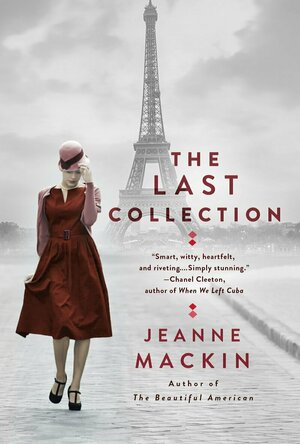
The Last Collection
Book
An American woman becomes entangled in the intense rivalry between iconic fashion designers Coco...
Historical Romance
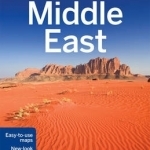
Lonely Planet Middle East
Lonely Planet, Anthony Ham, Jessica Lee and Sofia Barbarani
Book
Lonely Planet: The world's leading travel guide publisher Lonely Planet Middle East is your passport...
BookInspector (124 KP) rated Berlin Calling in Books
Sep 24, 2020
The plot of this book was really absorbing, and different from most of the WWII books I read. Normally, I encountered the books, which used to describe the tragedy of war, such as concentration camps or Jew’s killings, and their fighting for survival. This book was softer on that part, it mentioned the cruelties’ which happened during the war, but never in so much detail to make it stomach turning. It was written more about the political aspects of it, and how German propaganda was used to influence people from other countries. It’s been a while since I studied history of WWII, and I studied from different countries’ perspective, so to see how it looked from Germany's perspective was quite appealing. I think that author was trying to show, how Germans thought about this war and why most of them supported what Hitler was doing.
I am a big fan of short chapters, and this book didn’t disappoint me with that. The chapters were divided into smaller parts, which made it more pleasant to read. Every chapter was quite detailed, but the meaning and the point of that chapter was very lovely opened, and concluded for the reader. The story was flowing nicely and smoothly. I believe Author has a great personal knowledge about war, and used it greatly in this book. There was a little bit of monotony while reading this book, and lack of twists and turns, that would’ve make it more exciting. The language used was not difficult and easy to read, but I had to look up some German terms used in this book, as I’m not familiar with the language. The ending of the book was really entertaining but not complete. I wished more conclusions, and to know what happened to Dieter. To conclude, it is a great book if you looking for World War II stories of war from German perspective, love, and survival.
Zuky the BookBum (15 KP) rated The Witchfinder's Sister in Books
Mar 15, 2018
<i>The Witchfinder’s Sister</i> is based on true life witch hunter Matthew Hopkins that grew to fame during the English Civil War around East Anglia, hunting and killing “witches”. This book isn’t non-fiction, it’s fiction based around non-fiction! I love these sorts of books that create their own stories from something that was very much real. Not only does it make for good reading, they also bring in some true history facts, so you’re being educated on the subject as you read.
High praise goes to Underdown for this novel. I feel like historical fiction can be hard genre to get right, and considering this is a <i>debut</i> novel, I’m amazed at how well put together and beautiful this has turned out to be! I love reading historical fiction, every once in awhile, and this is the sort of book that keeps my love for the genre burning.
The writing in this novel was haunting and beautiful. Nine times out of ten, it was exactly as you would have imagined the 17th Century to be, but I felt there were a few slips that made the book feel modern. For example, would a lady in 1645 say the phrase <i><b>“shitting herself”</b></i>? Correct me if I’m wrong, but that feels like a reasonably modern phrase to me.
I loved our main character, Alice. Me and my mum were talking about historical fiction novels and how we find it hard to understand why women make the decisions they make in these books, because we’re so used to having some equality and independence. But I noted that in this book, even though Alice is inferior to her brother and his counterparts, she is still a risk taker; going against her brother's wishes & sneaking around. I liked that she was strong and a little rebellious, it was so much easier to connect with her because of this.
On the other hand. I <i>hated</i> Matthew. He was a despicable character. I can rarely hate a character in a book, even if I’m supposed to. I tend to find the good in them at some point, or have some sort of sympathy for them, but I absolutely despised Matthew. Well done to Underdown for creating such a hate-inducing character. It’s quite a hard feat, but she managed it perfectly. The same goes for Mary Phillips.
The tension was built so well in this novel, you could feel the mystery growing and growing with every page and I loved it! Though the story moved reasonably slowly, the book was still absolutely riveting and I found it extremely hard to put down when I knew it was time to get some rest.
I am so, so excited to read more from Underdown. This was an amazingly well put together and researched.
<i>Thanks to Netgalley and Penguin Books UK for giving me the opportunity to read this in exchange for an honest review.</i>

